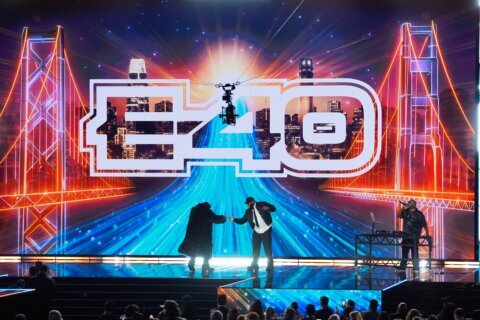WASHINGTON — It’s routinely voted one of the funniest movies of all time — deservedly so.
This Thursday night, “Monty Python & The Holy Grail” (1975) brings its hilarious spoof of Arthurian legend to D.C.’s Warner Theatre for a special screening and Q&A with John Cleese.
“We show the movie, then I come up and explain to the audience why it’s nowhere near as funny as they think,” Cleese told WTOP. “They ask me lots of questions, which are very nice. Some are extremely rude, intrusive and vastly entertaining. Some of them are extremely silly.”
The film is a master class in comedy by the British comedy troupe comprised of Cleese, Graham Chapman, Eric Idle, Michael Palin, Terry Gilliam and Terry Jones. While the latter two co-directed the film, it’s Cleese who delivers some of the movie’s most iconic moments.
We cry laughing as his Black Knight loses his limbs but insists, “It’s only a flesh wound.”
“I told Graham a story that I’d been told when I was 15 about a wrestling match in Rome where two wrestlers got so intertwined there was a loud crack,” Cleese said. “One guy’s arm was broken, the referee sent him off and [told] the other guy he’d won and the other guy died. That struck me as terribly funny. … If you didn’t give up, you couldn’t be beaten.”
The humor ramps up as the relentless Black Knight increasingly loses more limbs.
“What’s so funny [is] he’s not even disappointed, let alone showing it hurts,” Cleese said. “If he did indicate for a moment that he was hurt, the audience would stop laughing. … A guy who only had one leg, a monopod, was a silver smith in the city of London. His name — I like this — was Richard Burton! He took over and put my armor on after I’d lost one of my legs.”
It’s also Cleese who plays the dead-body collector who discovers one man is “not dead yet.”
“Graham and I wrote that, but when you write with someone, you never remember afterward which one of you said what,” Cleese said. “I bring the guy out and he says, ‘I’m not dead yet,’ I say something like, ‘Shut up, you’ll be dead soon,’ and he says, ‘But I’m not dead yet!”
The black humor is quite genius in its ability to make us laugh at a typically cruel scenario.
“It’s extraordinary that I want to laugh at something so cruel, but it’s like a cartoon,” Cleese said. “That’s why we can laugh at it so much, because nobody’s really upset. There’s a lot of really black humor, but it’s silly humor. Nobody takes it any more seriously than Tom & Jerry.”
Other times, the humor is all in the delivery, such as Cleese’s pregnant pause as the witch-hunting villager. Notice the delay as he says, “She turned me into a newt! … I got better.”
“When he says, ‘She tuned me into a newt,’ there’s a pause while everyone around him looks at him and registers the fact that he’s definitely not a newt at that moment,” Cleese said, laughing. “So then he has to modify his excuse. You’re right, it’s the pause that’s funny!”
For so many classic comedy moments, it’s hard to believe it almost never came together.
“When we were writing the script, we had no idea what we were doing and certainly had no idea what the film was going to be about,” Cleese said. “We threw away 90 percent of the first draft. It just wasn’t any good. I mean it was funny, it just didn’t hang together in any way.”
Suddenly, they found inspiration in Palin’s idea to clank coconuts as galloping horses.
“When we focused on Michael’s piece with the coconuts, we suddenly felt, ‘This is what the movie’s about. This is it,'” Cleese said. “We just got a sense that we should be writing it in that [time] period. The first draft was a lot of stuff from modern day. Once we decided to make it Medieval, we were away — and very lucky in retrospect. Because it’s historical, it never dates.”
While the comedy certainly holds up, Cleese thinks the ending could have been better.
“I think the first 50 minutes are wonderful, but I don’t like the ending,” Cleese said. “It’s as if those seven minutes are cut into ‘Holy Grail’ from a completely different kind of movie. … In fact, I’ve reedited the ending. I will show the audience my version of the ending. I reedited it about 10 days ago [and] we recut it two or three times to make it rather less boring, frankly.”
Why does he think the original ending drags?
“It’s Terry Gilliam showing us he can direct adult movies,” Cleese said. “Lots of smoke, which makes the shots look good but god knows where the smoke comes from. Lots of stunning visuals that aren’t the slightest bit funny. I would have edited it differently, but that’s the thing about the Pythons; there’s very little we agree on except the need for good food and wine.”
If they disagreed behind the scenes, they brought us classic bits on screen with TV’s “Flying Circus” (1969-1974). Most famous was the “Dead Parrot Sketch,” which inspired everything from Jerry’s “spite” return in “Seinfeld” to Jim Carrey’s headless bird in “Dumb & Dumber.”
After “Holy Grail,” the group delivered other hilarious films with “Life of Brian” (1979), about the manger next door to Jesus, and “Meaning of Life” (1983), examining life in all its stages.
Since then, Cleese has continued to crack us up, from TV’s “Fawlty Towers” (1975-1979) to the comedy heist flick “A Fish Called Wanda” (1988). He also blessed Eric Idle’s Broadway smash “Spamalot” (2004), a musical version of “The Holy Grail” that used elements from the other films, namely the “Life of Brian” whistling tune “Always Look on the Bright Side of Life.”
You can ask about any of these Thursday night at Warner Theatre.
“I have the nicest fans,” Clees said. “They’ve got a nice sense of humor and really know how to laugh. None of that polite smiling! The other thing is they’re silly. Some come dressed as Python characters. It’s a terribly happy event. … You look out and think, ‘Actually, the world isn’t too bad a place.’ We need a little bit of communal feeling and laughter at the moment.”
Click here for more event details. Hear our full conversation with John Cleese below:








